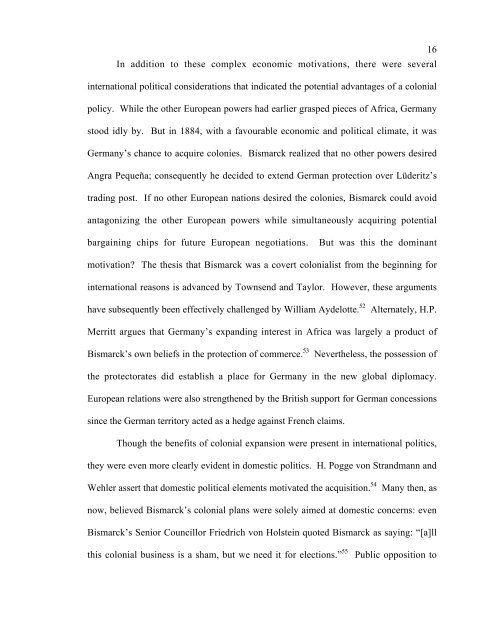A Deterritorialized History: Investigating German Colonialism ...
A Deterritorialized History: Investigating German Colonialism ...
A Deterritorialized History: Investigating German Colonialism ...
You also want an ePaper? Increase the reach of your titles
YUMPU automatically turns print PDFs into web optimized ePapers that Google loves.
In addition to these complex economic motivations, there were several<br />
international political considerations that indicated the potential advantages of a colonial<br />
policy. While the other European powers had earlier grasped pieces of Africa, <strong>German</strong>y<br />
stood idly by. But in 1884, with a favourable economic and political climate, it was<br />
<strong>German</strong>y’s chance to acquire colonies. Bismarck realized that no other powers desired<br />
Angra Pequeña; consequently he decided to extend <strong>German</strong> protection over Lüderitz’s<br />
trading post. If no other European nations desired the colonies, Bismarck could avoid<br />
antagonizing the other European powers while simultaneously acquiring potential<br />
bargaining chips for future European negotiations. But was this the dominant<br />
motivation? The thesis that Bismarck was a covert colonialist from the beginning for<br />
international reasons is advanced by Townsend and Taylor. However, these arguments<br />
have subsequently been effectively challenged by William Aydelotte. 52 Alternately, H.P.<br />
Merritt argues that <strong>German</strong>y’s expanding interest in Africa was largely a product of<br />
Bismarck’s own beliefs in the protection of commerce. 53 Nevertheless, the possession of<br />
the protectorates did establish a place for <strong>German</strong>y in the new global diplomacy.<br />
European relations were also strengthened by the British support for <strong>German</strong> concessions<br />
since the <strong>German</strong> territory acted as a hedge against French claims.<br />
Though the benefits of colonial expansion were present in international politics,<br />
they were even more clearly evident in domestic politics. H. Pogge von Strandmann and<br />
Wehler assert that domestic political elements motivated the acquisition. 54 Many then, as<br />
now, believed Bismarck’s colonial plans were solely aimed at domestic concerns: even<br />
Bismarck’s Senior Councillor Friedrich von Holstein quoted Bismarck as saying: “[a]ll<br />
this colonial business is a sham, but we need it for elections.” 55 Public opposition to<br />
16
















